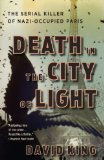Summary | Excerpt | Reviews | Beyond the Book | Readalikes | Genres & Themes | Author Bio

The Serial Killer of Nazi-Occupied Paris
by David King
A swastika had flown over the building across from Petiot's property.
The garage at No. 22 had been appropriated by Albert Speer's
Organization Todt, a vast supply company that supervised German construction projects in Occupied Europe. In Paris, this group was doing
everything from melting down bronze statues for armaments to sending
laborers north to construct the Atlantic Wall against an Allied invasion.
The French police, of course, had no authority over the Gestapo
or any of its activities. In a protocol signed with SS Brigadier General
Karl Oberg on April 18, 1943, the secretary general of the French
police, René Bousquet, had to agree to work with the occupying power to maintain "calm and order in an always efficient manner." Specifically, the French would have to help German police combat the "attacks of the communists, terrorists, agents of the enemy and saboteurs as well as those who support them: Jews, Bolsheviks, Anglo-Americans." To add further insult to humiliation, French policemen had to salute German officials whenever they encountered them in the street - this was the
notorious Grusspflicht.
This subordination was to be endured, the argument went, because
it was preferable to the alternative: namely, a police force staffed only
by the occupying power and the many extremist militaristic organizations that collaborated with the Nazis. Such circumstances would not only lead to frightening police brutality, but also offer few chances to sabotage German authorities. Many members of Resistance organizations, on the other hand, scorned this position as a mere rationalization of a cowardly, self-interested collaboration between enemy and traitors.
Still, despite his initial hunch that the human remains on rue Le Sueur
were somehow tied to the Gestapo, Massu had some nagging doubts. For one thing, he had not been warned off the site, as surely would have happened in advance or soon after the discovery of the bodies on its premises if there had been a Gestapo affiliation. Nor had he encountered any Gestapo agents on the property, which also would likely have occurred if the building had served as an extension of the secret state police. Hours after the initial phone call from his secretary, Massu had still not received any communication from German authorities.
COMMISSAIRE Massu arrived at his office at 36 Quai des
Orfèvres on the Île de la Cité about nine o'clock on the morning of March 12, 1944. His windows on the third floor of the sprawling Police Judiciaire overlooked the horse chestnut trees of the place Dauphine, the restaurant Le Vert-Galant, and the Pont Neuf, the oldest bridge in Paris and still standing despite the increased threat of Allied bombing raids. Some inspectors were drawing up reports; others looked after detainees in the corridors, none of whom, unfortunately, would turn out to have anything to do with 21 rue Le Sueur. Picking up the Petiot file, which was begun the previous night, Massu prepared to return to the town house to meet a team of dignitaries and officials that included his immediate superior, the prefect of police Amédée Bussière, who was
eager to inspect the site for himself as he would have to report to both
French and German authorities.
At ten o'clock that morning, the German-controlled broadcasting
organization Radio Paris first announced the gruesome discovery
of the charnel house on rue Le Sueur. "Petiot has fled Paris," the presenter said, not wasting any time to speculate on the suspect's whereabouts. "He will likely return to the terrorist bands of Haute-Savoie," as officials dubbed the Resistance fighters in the Alpine region bordering
Switzerland, "and resume his position as médecin-major." In this initial broadcast, as well as many others that followed that day, the radio station painted a portrait of the killer as an outlaw terrorist who opposed the Third Reich.
Excerpted from Death in the City of Light by David King. Copyright © 2011 by David King. Excerpted by permission of Crown. All rights reserved. No part of this excerpt may be reproduced or reprinted without permission in writing from the publisher.




Show me the books he loves and I shall know the man...
Click Here to find out who said this, as well as discovering other famous literary quotes!
Your guide toexceptional books
BookBrowse seeks out and recommends the best in contemporary fiction and nonfiction—books that not only engage and entertain but also deepen our understanding of ourselves and the world around us.